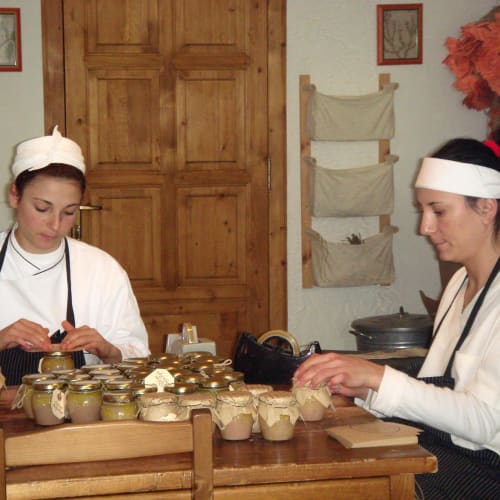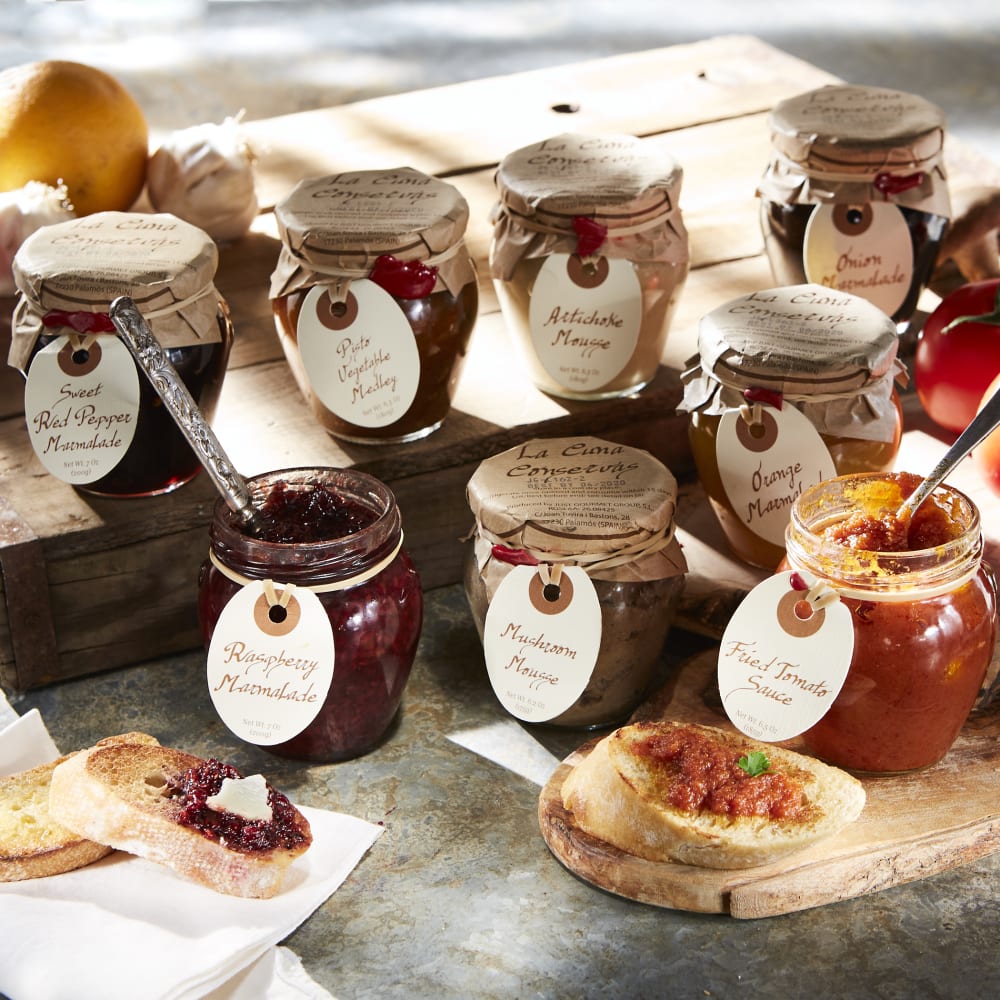The Kitchen is the Best Medicine of All
November 2006




I imagine that these days you are thinking about what you are going to prepare for Thanksgiving Day, when many of you will gather with your extended family and friends. I thought you would be intrigued by the story of a remarkable couple, Angel and Cristina.
Angel and Cristina live in the Province of Toledo, where they renovated a rustic building in the rural village of Malpica de Tajo. They retained the traditional whitewashed appearance and terra-cotta floors and then added all the touches of a modern commercial kitchen. Each day they go into their kitchen and cook the most extraordinary products by hand - just as their families have for generations.
Earlier this year my good friend Esther, an excellent post-graduate student in Madrid, suggested we go visit them. Since we were not planning to go to Spain soon, we asked our friend Jamie to go to their village. When he arrived, he saw Cristina take a large wooden spoon and carefully stir a vast paella pan that was bubbling with fragrant tomate frito sauce. They allow it to simmer for eight hours so that the flavors blend to their exacting standard.
He was so impressed with Angel and Cristina's talent and integrity, that I asked him to get to know Angel and Cristina even better. As you read what Angel says about his life, I hope you appreciate the romantic spirit that this couple embodies -- it is the essence of being a Spaniard.
Angel recounts that as a young child he and his brother would spend the summer with their parents at El Hoyo, an ancient rustic estate in the heart of the Sierra Madrona Mountains. It is an area in Córdoba that is one of Spain's least populated places. It is so remote that when the Spanish Civil War ended in 1939, most villagers were unaware that a war had even erupted three years earlier.
The village of El Hoyo is in the center of the old estate of the same name. When his father would make a trip to the village to pick up supplies, Angel would tag along and buy caramelos (little wrapped candies) and pipas (sunflower seeds) -- 50 centimos for the caramelos and 5 pesetas for the pipas. Then, each winter, when he was back at school in Madrid, he would sell his caramelos and pipas to make a small profit. In those early years money was short, food was scarce and time seemed to stop.
While at the finca/farm Angel and his brother would spend some of their spare time helping their parents. There were the usual routine chores to be done around the house, but the task Angel liked best was when he was helping in the family kitchen. He fondly remembers lingering there after his chores were done, because, as in any country home, the household kitchen was the center of activity. He loved to hear older members of his extended family engaging in long conversations while gathered around the kitchen hearth.
"These precious experiences I had as a child," Angel said with typical Spanish fervor, "I mean the aromas and flavors which enveloped our family gatherings - they are forever imprinted on my soul." As he grew up during the next few years, Angel dreamed that somehow he would recapture these the happiest days of his life. He knew one thing, it would have to be linked to the hearth.
One day Angel, now a young man, struck up a conversation with a young woman in a café in Madrid. Her name was Cristina. Their conversation turned out to be one of those exhilarating exchanges that occur when two strangers accidentally meet and find in each other a soul-mate.
Angel recounts with great emotion how their chance contact and the conversation that ensued embarked them on a dream from which they still have not awakened. They were on a quest to recover the traditions, the flavors and memories they cherished from the cradle and to share them with others.
With an intense sense of purpose, Cristina and Angel embarked on their journey to learn all that they could about the traditional food each enjoyed as a child. They traveled the byways of Spain, visiting many farmers, witnessing the sacrifice of the Ibérico pigs and getting to know fine family bodegas and cellars. Best of all, they shared the finest and most delicious of foods throughout Spain. When they returned home they applied their experiences to the kitchen hearth, learning to recreate what they had learned.
Angel reflects that sometimes he and Cristina ask each other whether they have been blessed or cursed, because they cannot rest from their quest for perfection. They know that their sense of warmth and family love, which began in the crib, is destined to be shared with those who search for the same. And so they started a small enterprise called La Cuna - which in English means, "The Cradle".
The aromas of a traditional Spanish kitchen waft throughout the neighborhood. The recipes they prepare in their La Cuna kitchen stem from these childhood memories and senses forged in the souls of Angel and his wife Cristina - fruit marmalades, honey, herbal tea, and marvelous sauces such as tomate frito, rich vegetable pisto and garlic.
La Cuna is Angel and Cristina's effort to relive those moments they loved. "They are moments," Angel explains, "that easily slip between ones fingers for lack of time - or perhaps more importantly - one does not know how to identify those moments and those small special things in our lives which truly anoint the soul and spirit."
After all, Angel told us: "To share three hours in the kitchen with those you love is probably more therapeutic than a thousand medicines, and as an old Spanish proverb says, 'The kitchen is the best medicine of all.'"
My family and I hope that many of you are able to experience some of those special moments when you gather together on Thanksgiving Day. Hearing about Angel and Cristina's life will encourage me to treasure the fleeting moments around the Thanksgiving table and to be grateful for those whom I love who are with me.
With best wishes to you and those whom you love,
Don

